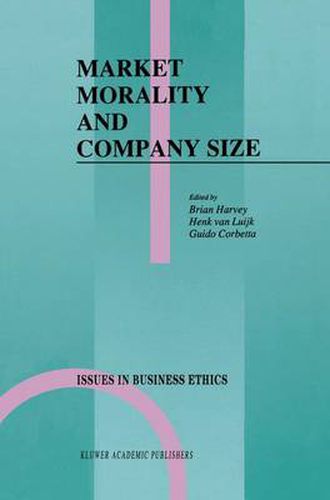Readings Newsletter
Become a Readings Member to make your shopping experience even easier.
Sign in or sign up for free!
You’re not far away from qualifying for FREE standard shipping within Australia
You’ve qualified for FREE standard shipping within Australia
The cart is loading…






This title is printed to order. This book may have been self-published. If so, we cannot guarantee the quality of the content. In the main most books will have gone through the editing process however some may not. We therefore suggest that you be aware of this before ordering this book. If in doubt check either the author or publisher’s details as we are unable to accept any returns unless they are faulty. Please contact us if you have any questions.
Henk van Luijk A continuing debate Business life and ethics have always had an uneasy relationship. Together they feel uncomfortable, separated from each other they feel truncated. But, in more ways than one they need each other. For, to paraphrase a famous expression of the philosopher Kant: business without an ethical orientation is blind, and ethics without business experience is void. There are two different reasons for this uneasy relationship, a moral and an economic one. Business activities are essentially motivated by the striving for profit, whereas ethical considerations are marked by an equal attention given to the interests of all relevant others. This is the moral reason. The economic reason is implied in the conviction that the market constitutes a morally neutral zone, or, to put it positively, that market participants take care not only of themselves but also of the general welfare by behaving in accordance with market rules and regulations. Both reaso~s playa role in discussions on the rela tion between business and ethics. For several decades, and more specifically since the beginning of the eighties, we have witnessed a continuing debate concerning the social responsibility of business, the content and extension of that responsibility and its moral and ideological basis. Positions are defended by business representatives and academics alike, under similar such headings as ‘ social responsibility of business’ or ‘corporate responsibility’, ‘business ethics’, ‘corporate ethics’ or ‘market morality’. Two, perhaps three, clusters of questions present themselves as particularly urgent.
$9.00 standard shipping within Australia
FREE standard shipping within Australia for orders over $100.00
Express & International shipping calculated at checkout
This title is printed to order. This book may have been self-published. If so, we cannot guarantee the quality of the content. In the main most books will have gone through the editing process however some may not. We therefore suggest that you be aware of this before ordering this book. If in doubt check either the author or publisher’s details as we are unable to accept any returns unless they are faulty. Please contact us if you have any questions.
Henk van Luijk A continuing debate Business life and ethics have always had an uneasy relationship. Together they feel uncomfortable, separated from each other they feel truncated. But, in more ways than one they need each other. For, to paraphrase a famous expression of the philosopher Kant: business without an ethical orientation is blind, and ethics without business experience is void. There are two different reasons for this uneasy relationship, a moral and an economic one. Business activities are essentially motivated by the striving for profit, whereas ethical considerations are marked by an equal attention given to the interests of all relevant others. This is the moral reason. The economic reason is implied in the conviction that the market constitutes a morally neutral zone, or, to put it positively, that market participants take care not only of themselves but also of the general welfare by behaving in accordance with market rules and regulations. Both reaso~s playa role in discussions on the rela tion between business and ethics. For several decades, and more specifically since the beginning of the eighties, we have witnessed a continuing debate concerning the social responsibility of business, the content and extension of that responsibility and its moral and ideological basis. Positions are defended by business representatives and academics alike, under similar such headings as ‘ social responsibility of business’ or ‘corporate responsibility’, ‘business ethics’, ‘corporate ethics’ or ‘market morality’. Two, perhaps three, clusters of questions present themselves as particularly urgent.